
Matt Robinson and the early Oscar the Grouch.
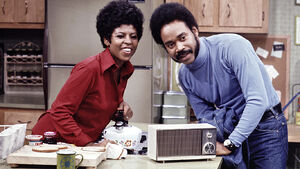
Robinson with Loretta Long as Susan.
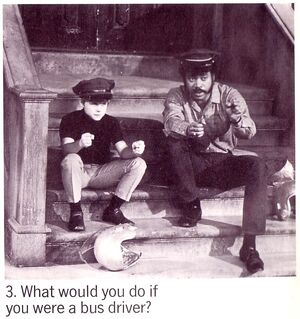
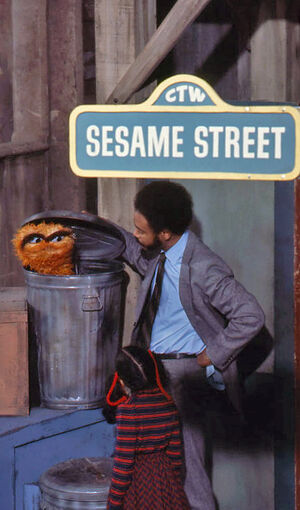
Robinson as Gordon, introducing Sally to Oscar in a publicity still from the first episode of Sesame Street.
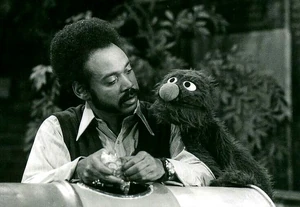
Robinson as Gordon with Grover.
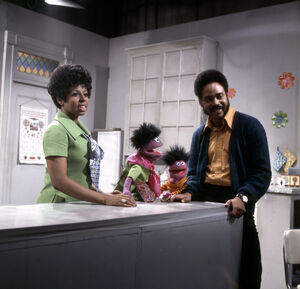
Loretta Long and Matt Robinson (Gordon) with Roosevelt Franklin and his mother.
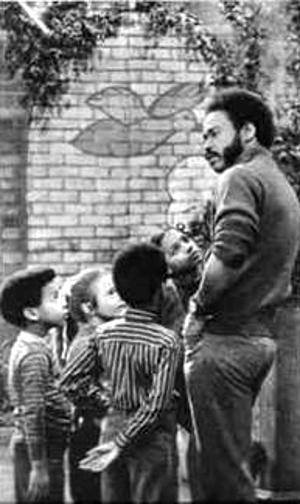
Matt Robinson (January 1, 1937 - August 5, 2002) was a writer, producer, and actor who originated the role of Gordon on Sesame Street, playing the part from 1969 to 1972. Robinson also created the character of Roosevelt Franklin, and performed Roosevelt's voice.[1]
Born in Philadelphia, Robinson graduated from Pennsylvania University in 1958 and penned the 1962 CBS slave revolt drama Rained All Night. Robinson began writing and producing black-oriented public affairs shows for Philadelphia TV station WCAU-TV, such as Opportunity in Philadelphia. Joining the creative staff at Children's Television Workshop, Robinson was initially hired to supervise the filmed segments focusing on people in different lands.
When the production team had difficulty finding the right actor for Gordon, who had been created as a strong male figure, Robinson took the part, and had the first spoken lines in the premiere episode of Sesame Street. He took his role seriously, as a role model for African-American children who lacked a positive father figure. "Somewhere around four or five," Robinson stated in the book All About Sesame Street, "a black kid is going to learn he’s black. He’s going to learn that’s positive or negative. What I want to project is a positive image."[2]
Robinson portrayed Gordon with an amiability and paternal attitude while occasionally alternating between standard grammar and "black" English, as the scene demanded and to better allow inner-city viewers to relate to the character. His dedication to Gordon's role model status occasionally led to conflicts with the show's other goals, as when complaints from feminists led to a 1970 storyline in which Susan takes a job as a nurse. All About Sesame Street described the situation:
In contrast to later Sesame Street cast members, Matt Robinson was also reluctant to have his children perform before the camera, though eventually son Matt Jr. and daughter Holly Robinson (later to star on 21 Jump Street) filmed a scene with him.
Robinson played Gordon in stage appearances and records, and also penned the 1972 volume Matt Robinson's Gordon of Sesame Street Storybook, an illustrated anthology of Robinson's original stories. He also scripted the Roosevelt Franklin segments and recorded the voices of Roosevelt and many other characters (including Baby Ray Franklin and Mobity Mosely) for the record album The Year of Roosevelt Franklin.
Robinson resigned from his role as Gordon on Sesame Street in 1972. However, as late as 1974, Robinson was still scripting and voicing Roosevelt Franklin segments for the series.
After leaving the series, Robinson returned to screenwriting, scripting the Shirley MacLaine thriller The Possession of Joel Delaney, contributing episodes of Sanford and Son, and writing and producing the musical documentary Save the Children and the comedy film Amazing Grace. The latter starred Rosalind Cash and aging African-American film pioneer Stepin Fetchit. Matt Robinson befriended the controversial actor in his last years, and following Fetchit's death, penned a one-man play, The Confessions of Stepin Fetchit. The play premiered in Off-Broadway at the American Place Theatre in 1993, starring Roscoe Orman, Robinson's long-term successor as Gordon.[3] Orman subsequently toured with the play.
In 1982, Robinson was diagnosed with Parkinson's disease. He continued to work, however, contributing scripts to Captain Kangaroo and becoming producer and head writer for The Cosby Show. He made a rare return to the camera in the 1990 episode "Cliff's Nightmare," which featured Muppet guest stars. In 2002, Robinson died at the age of 65.
Writing[]
Books[]
- Giveaway Gibson
- A Lot of Hot Water
- The Pecan Tree
- The Six-Button Dragon
- Gordon of Sesame Street Storybook
Music[]
Quotes[]
Sources[]
- ↑ Children's Television Workshop Season 3 press release, November 1970: "A versatile artist, Robinson created the character Roosevelt Franklin which Muppeteer Jim Henson has translated into an engaging black puppet figure. Robinson has written several songs for Roosevelt and voices the character as well."
- ↑ 2.0 2.1 Feinstein, Phyllis. All About Sesame Street, Tower Books, 1971.
- ↑ NYTimes Review
